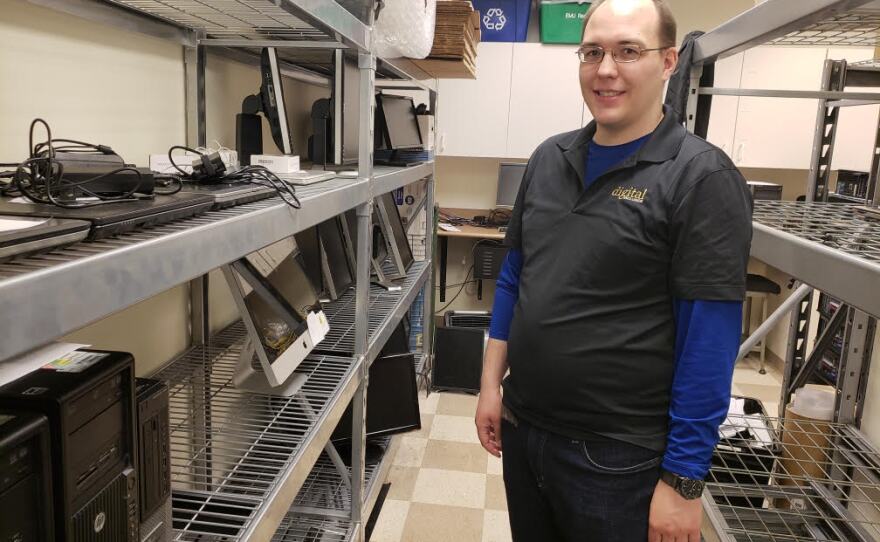A student-run tech shop at Eastern Michigan University does more than help the general public repair computer problems. It also provides an opportunity for low-income residents to own a computer. As 89.1 WEMU's Jorge Avellan reports, by-and-large, the work takes place while Hidden in Plain Sight.
Daniel: The screen is not turning on at all.
Matt: Right.
Lisa: And you took the battery apart a handful of times, and it would work for a little bit.
EMU senior Daniel Woike is the site lead for Digital Inclusion. Standing behind a service window at Boone Hall, he helps Ypsilanti residents Lisa Voelker and her husband Matt Siegfried with issues their having with their laptop.
"Obviously, I’ll take a look at it and see what we can do," said Woike.
Digital Inclusion was founded in 2008 with the help of the university, but, in 2015, it became a non-profit organization. They focus on refurbishing desktops and laptops to then sell them at about 50% below market rate. When it comes to repairing computers, that discount can be up to 70%. That’s music to Voelker’s ears.
"That was something that my husband Matt said this morning, let’s take it there, it’s probably much more affordable. And the fact that it’s learning based and students of EMU, matters as well," said Voelker.
While the services are available to the general public, since becoming a non-profit, 80% of the units they’ve worked on have gone to low-income residents and other non-profits in Washtenaw County. Woike explains Digital Inclusion’s goal.
"The idea is to help people who can’t afford technology and computers, to be able to receive those computers. Because as everyone knows, computers, the internet, access to the internet is very important in today’s society, it helps people move forward in their career," said Woike.
EMU mechanical engineering student Emmanuel Akor is on a budget. He used Digital Inclusion when he needed to get his laptop repaired.
"It makes a lot of difference because if I go to, let’s say Best Buy, to get my computer fixed, I’m going to pay a lot of money. And going to Digital Inclusion helped me save and it’s on campus so I don’t have to drive or get gas," said Akor.
Part of the mission is to also spark interest in technology among youth in Washtenaw County. Woike says in the past, Digital Inclusion has worked with districts, like Dexter Community Schools, by offering technology camps.
"For middle schools and high schools, I’ve done quite a few camps where I’ll teach them about basic computer hardware. So we’ll look through the desktop, we have some desktops here, and I’ll show them all the different parts of the desktop. And that also makes me feel kind of good because it’s really good service to the community and kids in particular. If they’re interested in computers and IT down the road, they kind have a first taste in one of our camps. Because that is not always something that a school, or maybe in their general life, that they’re able to really access," said Woike.
Digital Inclusion college interns also benefit from the non-profit. At the small, one-room store inside EMU’s Boone Hall, Dennis Fischer Jr. teaches John Milhorn how to work on a Toshiba laptop. Fischer is the site lead at Jackson College, the other location owned by Digital Inclusion, but he was at EMU to help with training.
"So this one is actually one of the donations that we had to get refurbished and it had a password set before it would boot up. And we needed to be able to reset it to actually go through the refurbishing process. So the quickest way on these types of laptops is to pull all of the power from them, and force them to drain all of their power from their circuits and they’ll forget that password," said Fischer.
Milhorn watches Fischer as he works on the laptop.
"I think it’s pretty interesting especially because of the fact that, recently, I switched to being an Information Assurance and Cyber Defense major, so I think it’s beneficial to watch someone who’s done that before and see how the process goes," said Milhorn.
Nine students currently help operate the Digital Inclusion store at EMU Monday through Friday, while three manage the Jackson College site. Jack Bidlack is president of Digital Inclusion. He says the group generates about $35,000 a year in sales. Ninety percent of that is used to support student labor and paid internships, while the other 10% is used for equipment and supplies. Bidlack says this is one of the reasons why they sell the computers at a low-cost instead of giving them away.
"We do make them very affordable, so if somebody comes to us and says, I can’t pay more than $50 for this, we’re going to find a unit that works for them and we’re going to work with them on the price to make sure we can get them into something. But we try to steer away from just straight-up donations because then there is no sustainability strategy for us and all we’re doing is hustling to get funding instead of making our own funding," said Bidlack.
Digital Inclusion hopes to expand to other universities nationwide to continue offering a low-cost service to not only the community, but low-income residents who otherwise may not have access to computers. And they rely on the public to donate their used computers to continue to make it happen.
Non-commercial, fact based reporting is made possible by your financial support. Make your donation to WEMU today to keep your community NPR station thriving.
Like 89.1 WEMU on Facebook and follow us on Twitter
— Jorge Avellan is a reporter for 89.1 WEMU News. Contact him at 734.487.3363 or email him javellan@emich.edu











